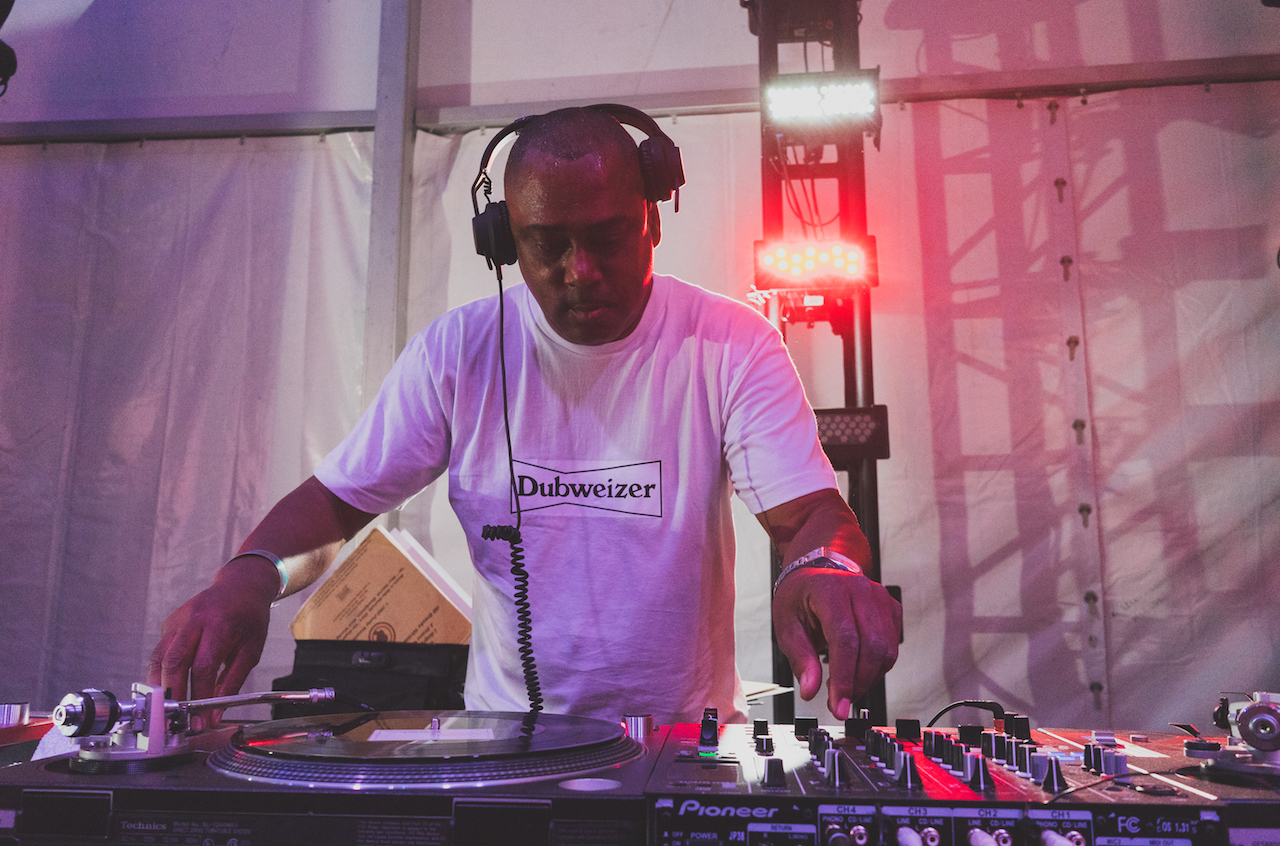- I've never been to a festival where the name of the city it takes place in is so frequently referenced. From slogans on t-shirts and shout-outs from performers, to conversations with cab drivers and the huge sign at the festival's exit, Detroit is the star whose status exceeds that of any artist playing the festival. And how could it not be? Detroit, with its rich musical history and recent signs of an unlikely economic revival, is a city people love to root for. The locals play a significant role in this. It's been very rough going here at times, but a sense of beleaguered pride seems to remain. When you couple all of this with Midwestern cordiality and an unpretentious crowd, you've got an almost ideal atmosphere for a three-day inner-city festival.
Movement celebrated its tenth anniversary in 2016. The history of Detroit's electronic music festival is long and complicated, and extends well beyond the decade that the events company Paxahau has been running the festival. But at this point Movement is a noticeably well-oiled machine that feels perfectly in tune with Hart Plaza, its long-time venue, and Detroit itself.
Leaving aside the many preparties, afterparties and other parties that take place alongside Movement, here are five key performances from across the weekend.
Mike Servito b2b Derek Plaslaiko
It must have been an exhausting few days for Mike Servito and Derek Plaslaiko. Both were booked for four sets (Servito had played RA and smartbar's opening party at TV Lounge the night before) and for expat Detroit DJs, Movement is probably the biggest social and professional date in the calendar. Their back-to-back performance fell on Movement's first day. The sun was shining on the festival's smallest stage, a grassy area framed by two trees, and the vibes were sky-high. The pair traded tracks, working through the sort of classically-informed, acid-tinged, tough-yet-funky style they're known for, while playfully egging each other on. Brendan Gillen and Erika Sherman's Interdimensional Tranmissions hosted the stage, and as Will Lynch noted when he profiled the label this time last year, this style and the acts associated with IT represent an archetypically Detroit sensibility, one that defined some of the best parts of my weekend. This was later encapsulated at the exceptionally good No Way Back at Tangent Gallery the following night, a party that aims to keep the original spirit of Detroit warehouse raves burning brightly.
Kraftwerk
Kraftwerk might be the most important booking Movement has ever made. After all, is there an act who were more integral to the creation of techno as we know it today? As the German four-piece began their set in the festival's main arena, a concrete amphitheatre with views of the Detroit skyline, the atmosphere in Hart Plaza suggested a seismic moment for the festival. For those, myself included, who didn't secure a spot in advance, the early stages were spent scouring the edges of the concrete bowl for a passable view, the sounds of "The Robots" filtering through a mass of obstructing bodies. I was content to fix my gaze on the nearby Renaissance Center, a symbol of the auto industry that's been so influential for the group, its strip lighting fading from orange to blue to white. Meanwhile on the video screen, 3D graphics showed a primitive depiction of an autobahn gently unfolding. The bicycle then became the focus, as black-and-white footage of the Tour De France accompanied the track of the same name. This was very much a greatest hits set, but the music's gentle march meant the audience's attention waned as the 90-minute set went on, a good number of people leaving in search of more standard dance floor thrills. Still, it was a set loaded with symbolism and significance.
DJ Godfather
As in years past, big European house and techno artists made up a large portion of this year's bill, a huge draw for the majority American audience, but maybe less of a novelty for those coming in from places like the UK and Germany. I was personally excited to see some of the regional US club styles on the lineup, some of which were programmed for the Red Bull Music Academy stage on the Monday afternoon. DJ Godfather is a key name in Detroit ghetto tech, and his set embodied its high-intensity, party-starting sound. He's an incredibly proficient scratch DJ, which was at once the best and worst thing about the set. A well-executed routine coupled with on-point shouts from the MC and tough, bouncing beats made for dance floor dynamite; but at other times the scratching and some cluttered mixing stymied the set's flow. Like footwork, ghetto house and Jersey club, ghetto tech is built on the repetition of commands—"Girl, bust it down," "Get freaky," "Put your ass on the floor,"—that move people in salacious ways. This is also true of New Orleans bounce, as Beyoncé collaborator Big Freedia showed in the next set, a carnival of call-and-response chants, hyper-aggressive drum breaks, massive pop samples and girls twerking on the speaker stacks.
Modeselektor
"I'm not into twerk, I'm into Kraftwerk," read the video screen during Modeselektor's performance of the track of the same name. They were closing the main stage on the festival's final day, and although their mashup of electro house, IDM, techno and hip-hop felt like a curveball for the slot, I was glad of the change in pace after a long weekend of four-on-the-floor. There was also nothing standard about the way Sebastian Szary hyped the crowd, striding to the front of the stage, pulling aside his boiler suit and revealing his nipple. "From Berlin to Detroit, make some noise!" he commanded when he returned to the console. They also weren't holding back on their selections, turning out hits like "The Black Block," Moderat's "A New Error" and LFO's "Freak." I turned back towards the Renaissance Center, as I'd done during Kraftwerk, to see a couple swaying and making out as some candy ravers pogoed around them.
Mike Huckaby
DJ Seoul, a local from the Detroit Techno Militia who played before Mike Huckaby, is a technical wiz in the vein of DJ Godfather. The speed and skill with which he cut, mixed and scratched between techno and electro tracks was at a level I've seen very few DJs achieve. Huckaby wisely reset the energy levels afterwards. He seemed most excited by tracks that blended tough house beats with the melodic sass of disco—Mood II Swing's "Do It Your Way," Norm Talley's "The Journey," Chesus & Earl Jeffers' "Jump"—which, given the outdoor setting and his 8 PM slot, felt just about right. Huckaby is another DJ who's ingrained in the Detroit scene, and his set attracted a broad cross-section of Movement's crowd. I danced next to a guy who was probably in his 50s—bald, wearing glasses, perspiring slightly. I imagined to myself that Movement was his annual rave, a local business owner or similar who couldn't help be swept up in what Detroit had achieved for itself.
Photo credits /
Lead - Douglas Wojciechowski
Mike Servito b2b Derek Plaslaiko - Chris Soltis
Kraftwerk - Bryan Mitchell
DJ Godfather - Bryan Mitchell
Modeselektor - Katie Laskowska
Mike Huckaby - Chris Soltis
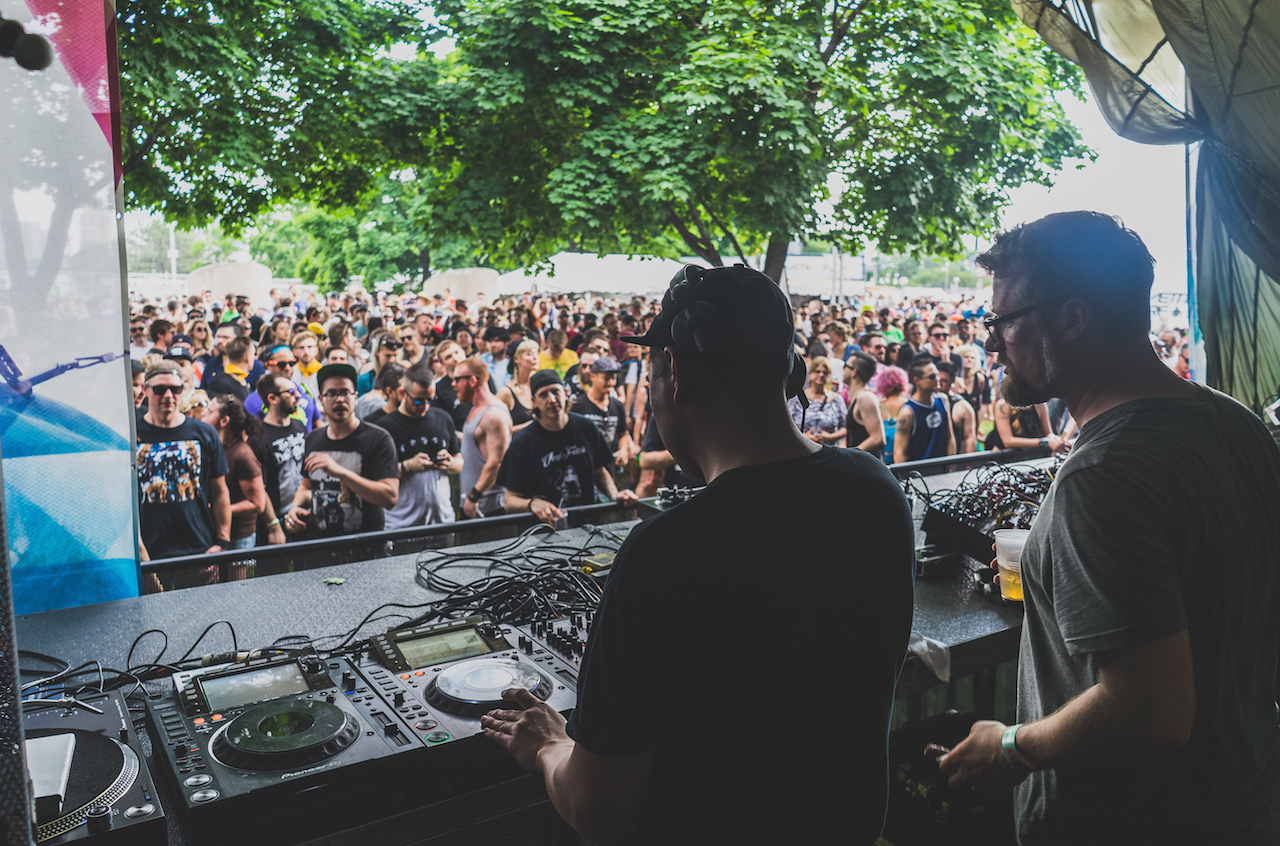 Kraftwerk Kraftwerk might be the most important booking Movement has ever made. After all, is there an act who were more integral to the creation of techno as we know it today? As the German four-piece began their set in the festival's main arena, a concrete amphitheatre with views of the Detroit skyline, the atmosphere in Hart Plaza suggested a seismic moment for the festival. For those, myself included, who didn't secure a spot in advance, the early stages were spent scouring the edges of the concrete bowl for a passable view, the sounds of "The Robots" filtering through a mass of obstructing bodies. I was content to fix my gaze on the nearby Renaissance Center, a symbol of the auto industry that's been so influential for the group, its strip lighting fading from orange to blue to white. Meanwhile on the video screen, 3D graphics showed a primitive depiction of an autobahn gently unfolding. The bicycle then became the focus, as black-and-white footage of the Tour De France accompanied the track of the same name. This was very much a greatest hits set, but the music's gentle march meant the audience's attention waned as the 90-minute set went on, a good number of people leaving in search of more standard dance floor thrills. Still, it was a set loaded with symbolism and significance.
Kraftwerk Kraftwerk might be the most important booking Movement has ever made. After all, is there an act who were more integral to the creation of techno as we know it today? As the German four-piece began their set in the festival's main arena, a concrete amphitheatre with views of the Detroit skyline, the atmosphere in Hart Plaza suggested a seismic moment for the festival. For those, myself included, who didn't secure a spot in advance, the early stages were spent scouring the edges of the concrete bowl for a passable view, the sounds of "The Robots" filtering through a mass of obstructing bodies. I was content to fix my gaze on the nearby Renaissance Center, a symbol of the auto industry that's been so influential for the group, its strip lighting fading from orange to blue to white. Meanwhile on the video screen, 3D graphics showed a primitive depiction of an autobahn gently unfolding. The bicycle then became the focus, as black-and-white footage of the Tour De France accompanied the track of the same name. This was very much a greatest hits set, but the music's gentle march meant the audience's attention waned as the 90-minute set went on, a good number of people leaving in search of more standard dance floor thrills. Still, it was a set loaded with symbolism and significance.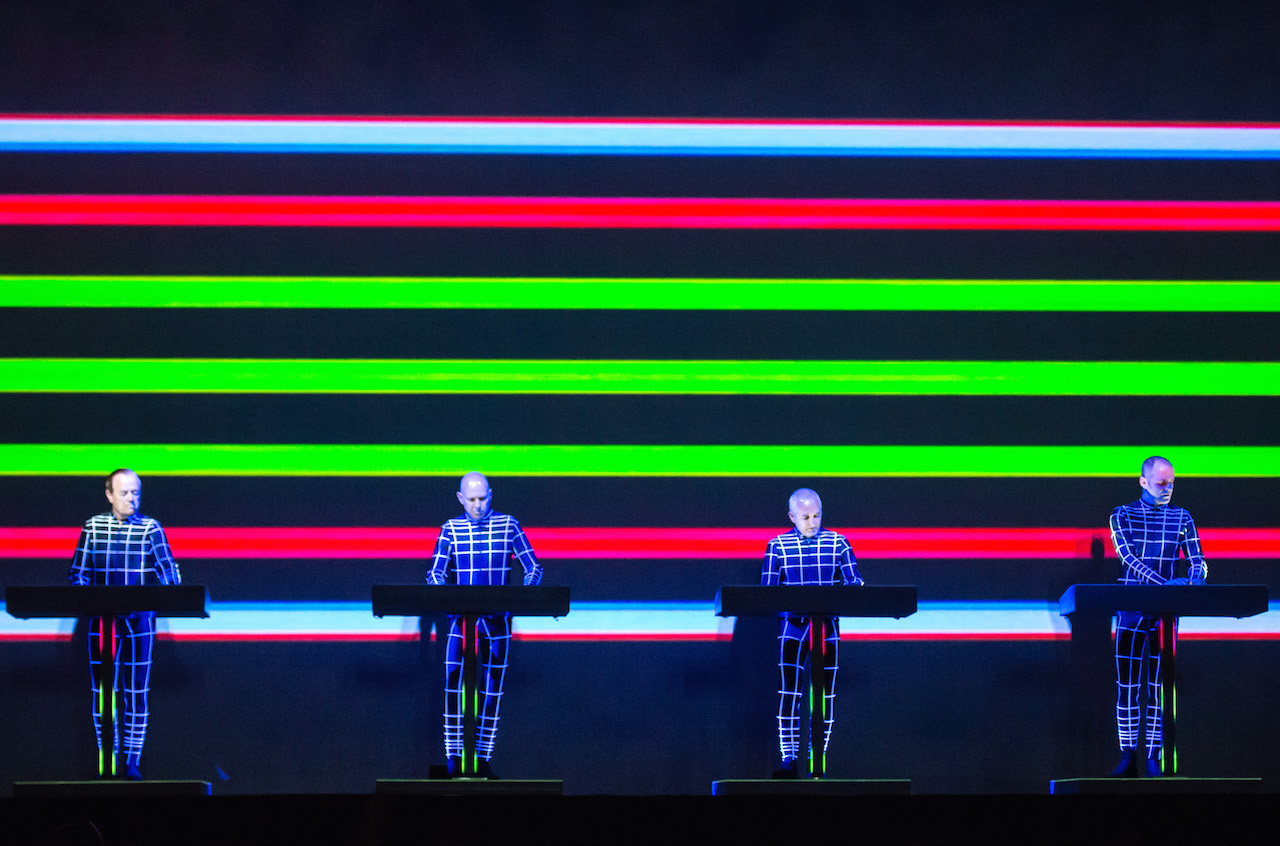 DJ Godfather As in years past, big European house and techno artists made up a large portion of this year's bill, a huge draw for the majority American audience, but maybe less of a novelty for those coming in from places like the UK and Germany. I was personally excited to see some of the regional US club styles on the lineup, some of which were programmed for the Red Bull Music Academy stage on the Monday afternoon. DJ Godfather is a key name in Detroit ghetto tech, and his set embodied its high-intensity, party-starting sound. He's an incredibly proficient scratch DJ, which was at once the best and worst thing about the set. A well-executed routine coupled with on-point shouts from the MC and tough, bouncing beats made for dance floor dynamite; but at other times the scratching and some cluttered mixing stymied the set's flow. Like footwork, ghetto house and Jersey club, ghetto tech is built on the repetition of commands—"Girl, bust it down," "Get freaky," "Put your ass on the floor,"—that move people in salacious ways. This is also true of New Orleans bounce, as Beyoncé collaborator Big Freedia showed in the next set, a carnival of call-and-response chants, hyper-aggressive drum breaks, massive pop samples and girls twerking on the speaker stacks.
DJ Godfather As in years past, big European house and techno artists made up a large portion of this year's bill, a huge draw for the majority American audience, but maybe less of a novelty for those coming in from places like the UK and Germany. I was personally excited to see some of the regional US club styles on the lineup, some of which were programmed for the Red Bull Music Academy stage on the Monday afternoon. DJ Godfather is a key name in Detroit ghetto tech, and his set embodied its high-intensity, party-starting sound. He's an incredibly proficient scratch DJ, which was at once the best and worst thing about the set. A well-executed routine coupled with on-point shouts from the MC and tough, bouncing beats made for dance floor dynamite; but at other times the scratching and some cluttered mixing stymied the set's flow. Like footwork, ghetto house and Jersey club, ghetto tech is built on the repetition of commands—"Girl, bust it down," "Get freaky," "Put your ass on the floor,"—that move people in salacious ways. This is also true of New Orleans bounce, as Beyoncé collaborator Big Freedia showed in the next set, a carnival of call-and-response chants, hyper-aggressive drum breaks, massive pop samples and girls twerking on the speaker stacks.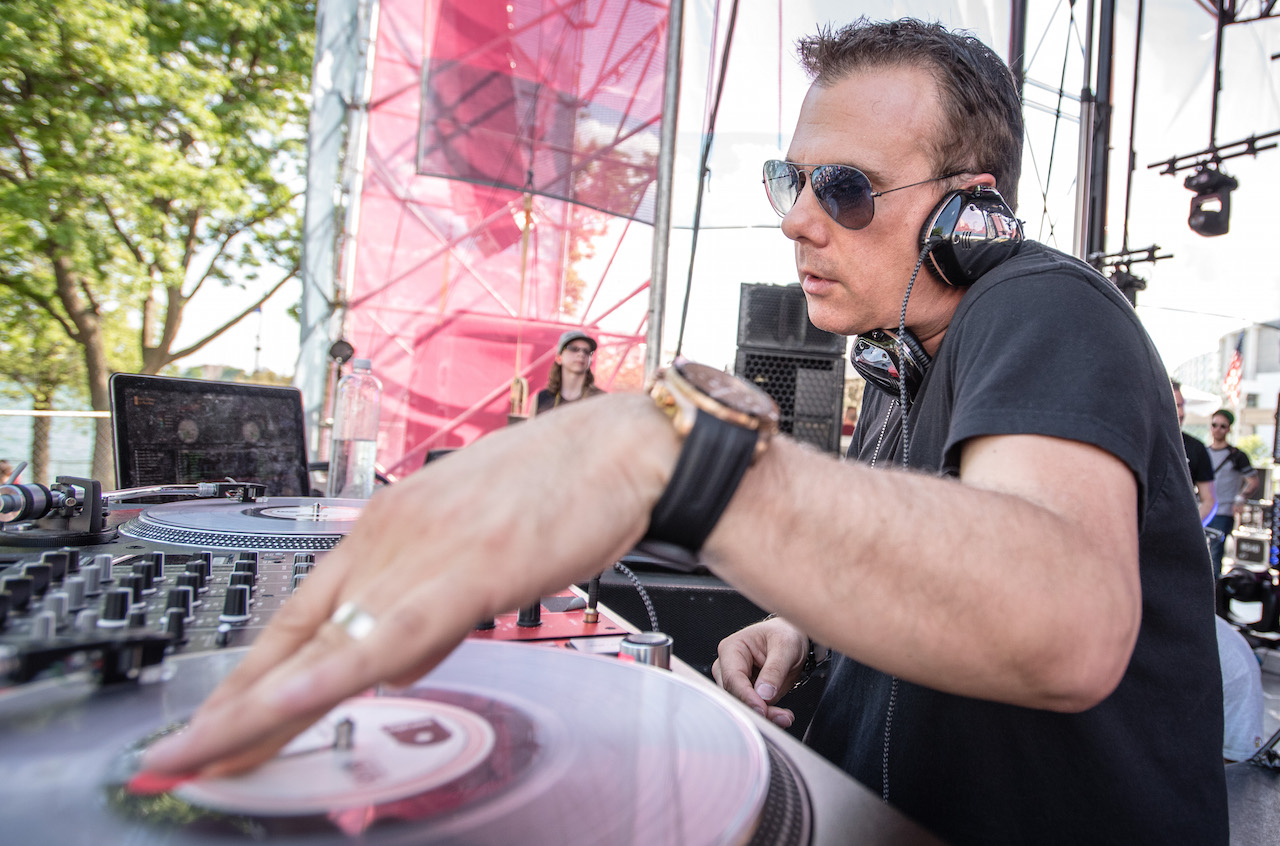 Modeselektor "I'm not into twerk, I'm into Kraftwerk," read the video screen during Modeselektor's performance of the track of the same name. They were closing the main stage on the festival's final day, and although their mashup of electro house, IDM, techno and hip-hop felt like a curveball for the slot, I was glad of the change in pace after a long weekend of four-on-the-floor. There was also nothing standard about the way Sebastian Szary hyped the crowd, striding to the front of the stage, pulling aside his boiler suit and revealing his nipple. "From Berlin to Detroit, make some noise!" he commanded when he returned to the console. They also weren't holding back on their selections, turning out hits like "The Black Block," Moderat's "A New Error" and LFO's "Freak." I turned back towards the Renaissance Center, as I'd done during Kraftwerk, to see a couple swaying and making out as some candy ravers pogoed around them.
Modeselektor "I'm not into twerk, I'm into Kraftwerk," read the video screen during Modeselektor's performance of the track of the same name. They were closing the main stage on the festival's final day, and although their mashup of electro house, IDM, techno and hip-hop felt like a curveball for the slot, I was glad of the change in pace after a long weekend of four-on-the-floor. There was also nothing standard about the way Sebastian Szary hyped the crowd, striding to the front of the stage, pulling aside his boiler suit and revealing his nipple. "From Berlin to Detroit, make some noise!" he commanded when he returned to the console. They also weren't holding back on their selections, turning out hits like "The Black Block," Moderat's "A New Error" and LFO's "Freak." I turned back towards the Renaissance Center, as I'd done during Kraftwerk, to see a couple swaying and making out as some candy ravers pogoed around them.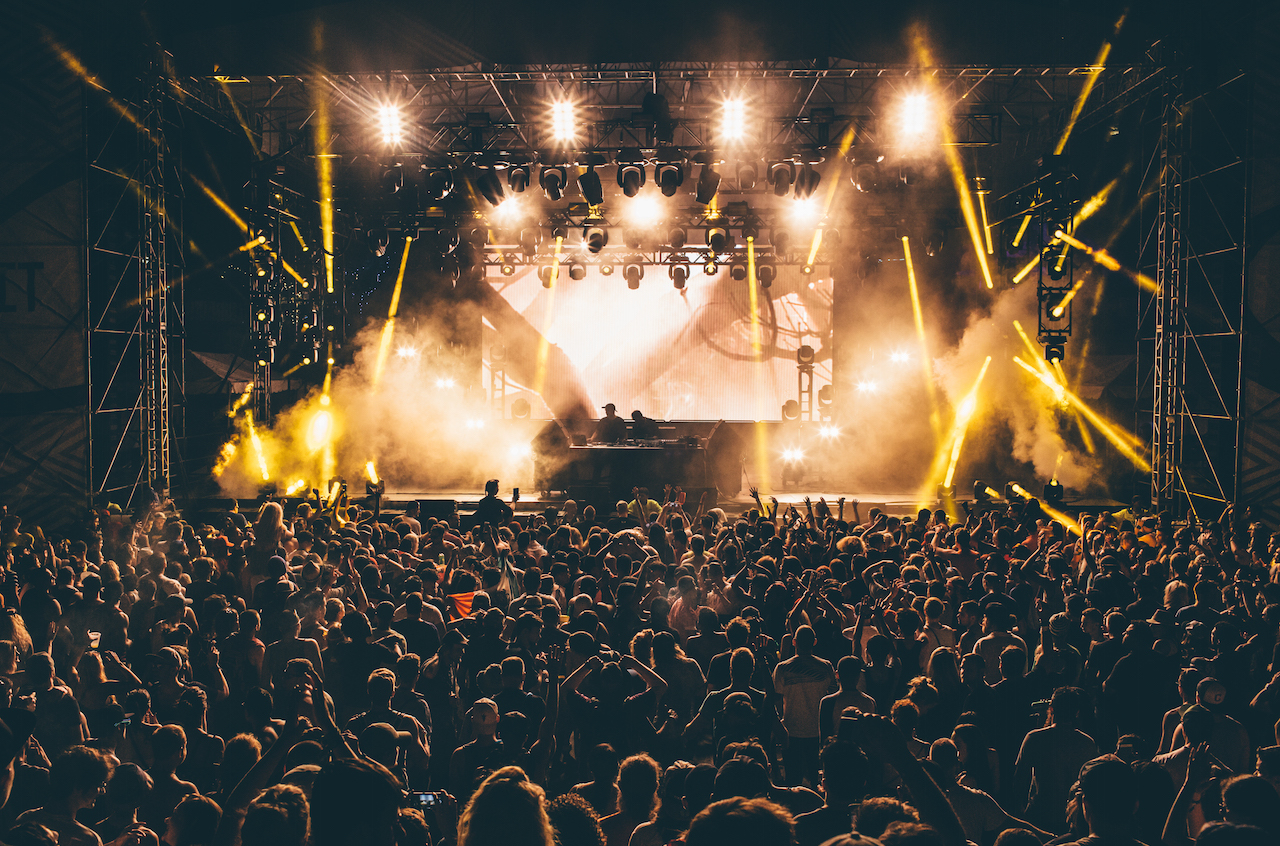 Mike Huckaby DJ Seoul, a local from the Detroit Techno Militia who played before Mike Huckaby, is a technical wiz in the vein of DJ Godfather. The speed and skill with which he cut, mixed and scratched between techno and electro tracks was at a level I've seen very few DJs achieve. Huckaby wisely reset the energy levels afterwards. He seemed most excited by tracks that blended tough house beats with the melodic sass of disco—Mood II Swing's "Do It Your Way," Norm Talley's "The Journey," Chesus & Earl Jeffers' "Jump"—which, given the outdoor setting and his 8 PM slot, felt just about right. Huckaby is another DJ who's ingrained in the Detroit scene, and his set attracted a broad cross-section of Movement's crowd. I danced next to a guy who was probably in his 50s—bald, wearing glasses, perspiring slightly. I imagined to myself that Movement was his annual rave, a local business owner or similar who couldn't help be swept up in what Detroit had achieved for itself. Photo credits / Lead - Douglas Wojciechowski Mike Servito b2b Derek Plaslaiko - Chris Soltis Kraftwerk - Bryan Mitchell DJ Godfather - Bryan Mitchell Modeselektor - Katie Laskowska Mike Huckaby - Chris Soltis
Mike Huckaby DJ Seoul, a local from the Detroit Techno Militia who played before Mike Huckaby, is a technical wiz in the vein of DJ Godfather. The speed and skill with which he cut, mixed and scratched between techno and electro tracks was at a level I've seen very few DJs achieve. Huckaby wisely reset the energy levels afterwards. He seemed most excited by tracks that blended tough house beats with the melodic sass of disco—Mood II Swing's "Do It Your Way," Norm Talley's "The Journey," Chesus & Earl Jeffers' "Jump"—which, given the outdoor setting and his 8 PM slot, felt just about right. Huckaby is another DJ who's ingrained in the Detroit scene, and his set attracted a broad cross-section of Movement's crowd. I danced next to a guy who was probably in his 50s—bald, wearing glasses, perspiring slightly. I imagined to myself that Movement was his annual rave, a local business owner or similar who couldn't help be swept up in what Detroit had achieved for itself. Photo credits / Lead - Douglas Wojciechowski Mike Servito b2b Derek Plaslaiko - Chris Soltis Kraftwerk - Bryan Mitchell DJ Godfather - Bryan Mitchell Modeselektor - Katie Laskowska Mike Huckaby - Chris Soltis